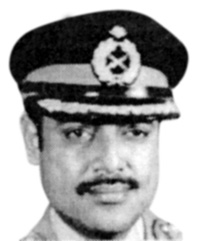
Back خاليد موشاراف ARZ খালেদ মোশাররফ Bengali/Bangla خالد مشرف FA Khaled Mosharraf French Khaled Mosharraf Portuguese Мошарраф, Халед Russian
Khaled Mosharraf | |
|---|---|
| খালেদ মোশাররফ | |
 Major General Mosharraf in Colonel insignia (c. 1972) | |
| Chief of Army Staff (de facto) | |
| In office 5 November 1975 – 7 November 1975 | |
| President | Khondaker Mostaq Ahmad Abu Sadat Mohammad Sayem |
| Prime Minister | None |
| Preceded by | Ziaur Rahman |
| Succeeded by | Ziaur Rahman |
| 1st Chief Martial Law Administrator of Bangladesh | |
| In office 3 November 1975 – 6 November 1975 | |
| President | Abu Sadat Mohammad Sayem |
| Preceded by | Position established |
| Succeeded by | Abu Sadat Mohammad Sayem |
| Personal details | |
| Born | 9 November 1937 Islampur, Bengal, British India |
| Died | 7 November 1975 (aged 37) Dacca Cantonment, Dhaka, Bangladesh |
| Manner of death | Assassination |
| Spouse | Salma Khaled |
| Relations | Rashed Mosharraf (brother) Sayed Farooq-ur-Rahman (Nephew) |
| Children | 3, including Mahjabeen Khaled |
| Alma mater | Dhaka College |
| Awards | |
| Military service | |
| Allegiance | |
| Branch/service | |
| Years of service | 1955-1975 |
| Rank | |
| Unit | East Bengal Regiment |
| Commands |
|
| Battles/wars | |
Khaled Mosharraf BU (Bengali: খালেদ মোশাররফ; 9 November 1937 – 7 November 1975) was a Major General in Bangladeshi army who is known for his role in the Bangladesh Liberation War and the subsequent coups in post-independence Bangladesh. After deposing Khondakar Mustaq Ahmad in the 3 November 1975 coup, Mosharraf was assassinated on 7 November 1975.[1]
During the outset of the Bangladesh Liberation War, Mosharraf was Second in Command of the 4th East Bengal Regiment in Comilla, which revolted against Pakistan on 27 March 1971.[2] During the war, Mosharraf was appointed the sector commander of sector 2, in addition to leading K Force and Crack Platoon.[3] After being wounded in combat, A.T.M. Haider was appointed as the new sector commander of sector 2.[3]
After the war ended, Mosharraf was awarded Bir Uttom, the second highest gallantry award and was appointed Chief of General Staff of Bangladesh Army.[4] Following the assassination of Sheikh Mujibur Rahman, the chain of command in the military broke down, which Mosharraf intended to restore on 3 November 1975 by removing Khondakar Mustaq Ahmad from power and exiling army officers responsible for Mujib's assassination.[5] On 7 November 1975, a counter-coup was organised by Lt. Colonel Abu Taher and his clandestine group Biplobi Shainik Sangstha, during which Mosharraf was killed, alongside Lt. Colonel A.T.M. Haider and Colonel Nazmul Huda.[1]
- ^ a b Lifschultz, Lawrence (1977). "Abu Taher's Last Testament: Bangladesh: The Unfinished Revolution". Economic and Political Weekly. 12 (33/34): 1309. ISSN 0012-9976. JSTOR 4365850.
- ^ Alam, Habibul; Pratik, Bir (26 March 2019). "Khaled Musharraf, Bir Uttam - The Commander". The Daily Star. Retrieved 17 June 2023.
Khaled being the 2IC and the senior most Bengali officer of the battalion took over the charge from Major Shafayat Jamil who made a very successful revolt of 4 EBR in Brahmanbaria on March 27, 1971.
- ^ a b "The day we lost Khaled Mosharraf". Dhaka Tribune (Opinion). 6 November 2021. Retrieved 17 June 2023.
- ^ "Mosharraf, Major General Khaled". Banglapedia. Retrieved 17 June 2023.
- ^ Lifschultz, Lawrence (1977). "Abu Taher's Last Testament: Bangladesh: The Unfinished Revolution". Economic and Political Weekly. 12 (33/34): 1305. ISSN 0012-9976. JSTOR 4365850.